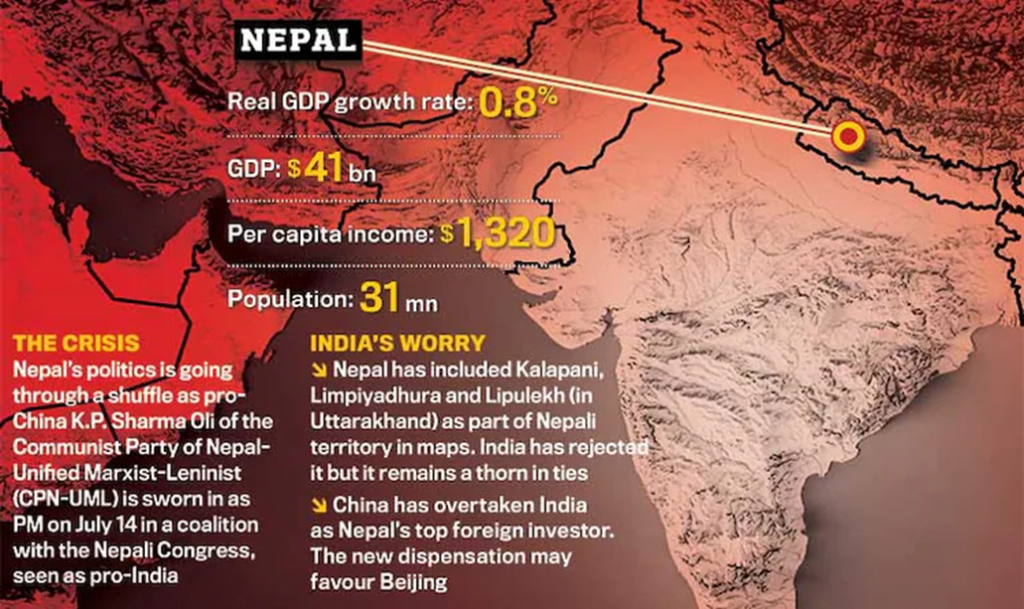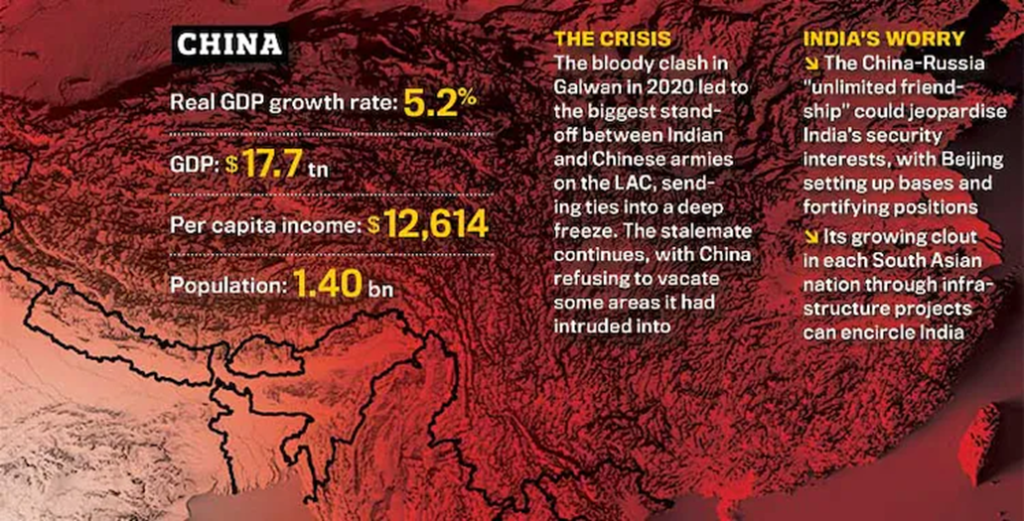Three of India’s neighbouring countries– Bangladesh, Sri Lanka, and Pakistan- have witnessed unusual shifts in their political environment including calls for politicians to step down and mass protests against ruling governments which often took a violent turn, killing and injuring numerous people.
Neighbours : Why India Should Worry
Why In News
- Three of India’s neighbouring countries– Bangladesh, Sri Lanka, and Pakistan- have witnessed unusual shifts in their political environment including calls for politicians to step down and mass protests against ruling governments which often took a violent turn, killing and injuring numerous people.
India & It’s Neighbours
- India
- India & Bangladesh
- India & Pakistan
- India & Maldives
- India & Sri Lanka
- India & Mayanmar
- India & Nepal
- India & China
India’s Neighbour Issues
- “India’s curse” is that it is surrounded by countries riven by deep domestic political cleavages. So, there is a dramatic improvement in relations when pro-India parties come to power, but things go rapidly downhill when alternative political forces gain ground.
- What has compounded the problem is that some of India’s neighbours are relatively new nation-states—Bangladesh itself came into existence only in 1971, just 53 years ago.
- Former National Security Advisor Shivshankar Menon points out that not only does India have a huge presence in the region, it also has tremendous influence both economically and in terms of society and tradition. Pakistan may be the only partial exception, since its identity and existence are self-defined by its difference with India.
- Menon recalls how Gen. Zia-ul-Haq, who ruled Pakistan in the 1980s, when asked why he was pushing for greater Islamisation of his country, reportedly said, “If an Egyptian stops being a Muslim, he still remains an Egyptian. But if a Pakistani stops being a Muslim, he becomes an Indian.”
- Menon’s point: Every new nation-state needs to have a perceived enemy to unify its citizens against it. The less the basis for the creation of a nation-state, the more antagonistic it will need to appear. And India is encircled by such nascent nations.
The Way Out
- Most experts advocate a massive push towards economic integration with its neighbours and a willingness to spend big bucks as China did with BRI.
- Menon is among those who believe that India should move beyond security being the leitmotif of its neighbourhood policy and focus instead on providing economic stability and enhancing prosperity. He adds another important condition: India should not push for reciprocity with its neighbours but, like the doctrine enunciated by former prime minister I.K. Gujral, give them more than what we take from them.
- “If America insists on reciprocity in its relations with India, do you think our ties with it will move forward rapidly?” asks Menon.
- India should take a leaf out of China’s playbook and work towards “making its enemies dependent on it”. And economics is the one realm where you can get maximum leverage, which means India should pursue an aggressive trade policy that enhances regional integration. Saran agrees and says what’s important is to have a range of such engagements that ensure “long-term interdependence” that can prevent “suicidal compulsions” for incoming hostile political dispensations.
- A new dimension should be added to the country’s neighbourhood policy in which “India fights its battles in the economic and financial front rows too”.
- Sri Lanka is a good example of how the Modi government played its cards well after the economic crisis of 2022 plunged the island-nation into uncertainty. Before that, China had wooed Sri Lanka with investments worth over $13 billion which included major infrastructure projects, related mainly to ports and urban development.
- But many of these proved to be white elephants and Sri Lanka’s debt to GDP ratio crossed an unsustainable 110 per cent. The economy was on the verge of collapse after Covid saw remittances dry up, the tourism industry crash and inflation in food, fertiliser and petrol prices soar.
- That’s when India stepped in and extended financial aid worth about $4 billion. And even as Chinese FDI dried up in the past four years, India pumped in close to $500 million in investments.
- India also managed to overcome Maldivian hostility with a call to boycott the Maldives as a tourist destination. With a 42 per cent drop in Indian tourists, the archipelago was soon urging Indians to be a part of its tourism since their economy depended on it. It also forced the ruling dispensation to tone down its anti-India rhetoric.
- Other experts advocate that India work towards massive infrastructure projects that can integrate the South Asian region better and bring about greater economic connectivity rather than allow China to take the lead.
- Absolutely critical is developing a strong regional trade association and pushing through a free trade agreement that can boost intra-regional trade. After the South Asian Association for Regional Cooperation (SAARC) got derailed because of India-Pakistan hostilities, India set up the Bay of Bengal Initiative for Multi-Sectoral Technical and Economic Cooperation (BIMSTEC) in 2004.
- Former prime minister A.B. Vajpayee once remarked, “You can’t change your neighbours, but you can change your friends.” India’s endeavour should now be to turn its neighbours into friends rather than be a natural magnet for their resentment because of its size and proximity.























